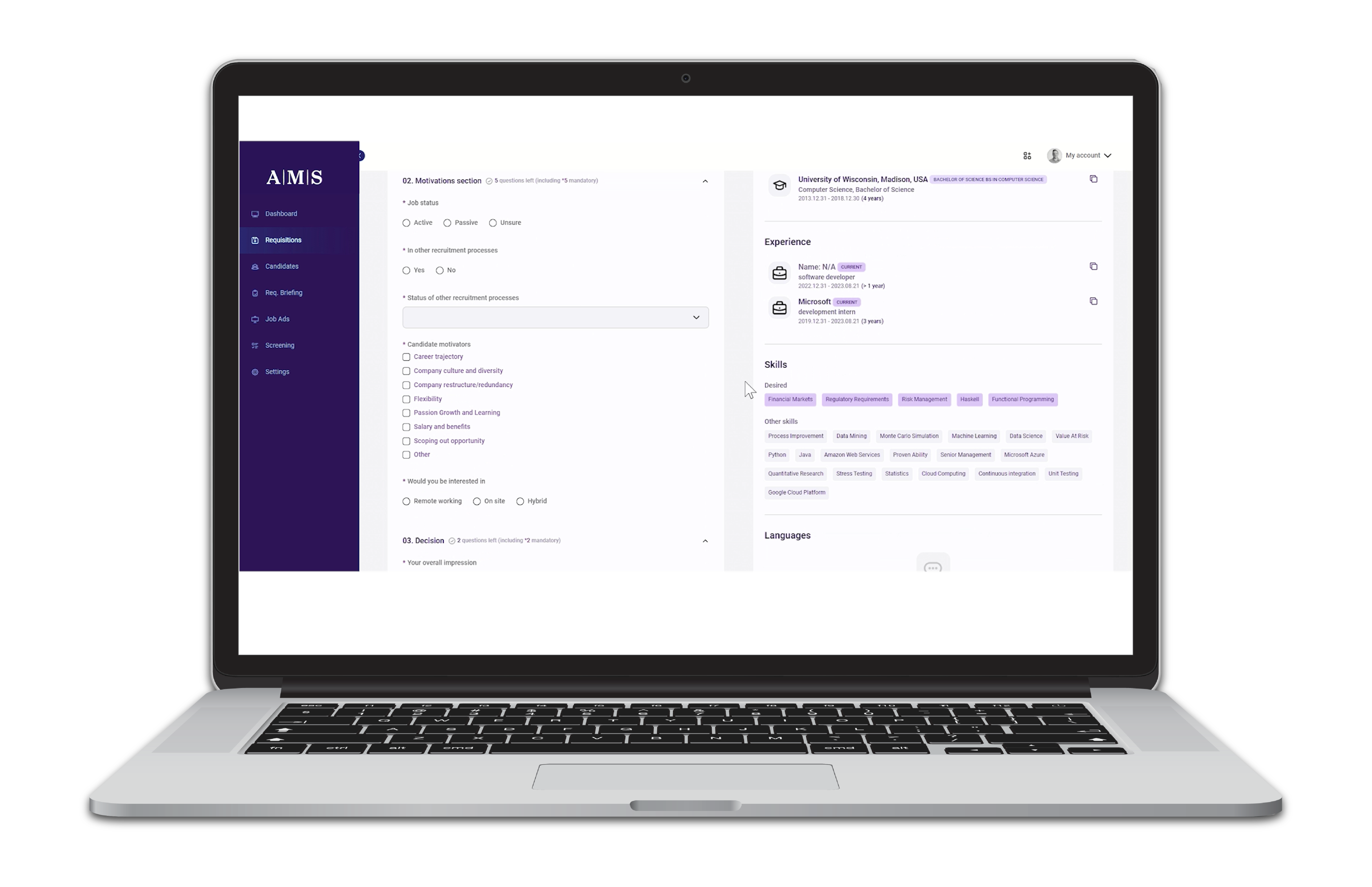
Talking Tech and RPO
5 big questions when modernizing hiring using tech-enabled RPOs
As the talent acquisition (TA) landscape continues to fluctuate, talent teams are looking for the most effective ways to manage and optimize their hiring function. Candidate expectations have changed, and technology is at the core of the employment experience. A Recruitment Process Outsourcing (RPO) partnership remains important, but it has evolved – and will need to be tech-forward and adaptable to reach today’s modern hiring goals.
Recruitment as a concept is simple. Identify, find, hire and onboard new talent. But recruitment in the context of the digital world requires a new lens.
Think of it like the evolution of air travel. In the past, you would buy a ticket for a flight using the telephone. You would receive a paper copy of your ticket and then board your flight. Now, every step from ticket purchase, to check-in, baggage tagging, seat selection and monitoring flight disruptions is tech-enabled. Our collective digital experience spans many industries, and this is no different in the HR and TA world. Steadily, aspects of recruitment are advancing with rich data, AI, new features, insights, modules and tools.
Whether you’re in the research phase of discovering the right tech to support your hiring, or you are selecting an RPO and comparing the sophistication of recruitment platforms, you will want to ensure recruiters are equipped with the most efficient processes, and a seamless and meaningful interaction with candidates. A tech-enabled RPO helps you find and keep talent at the pace your business requires.
Below are five common questions we are hearing from talent teams as they navigate RPOs in a rapidly evolving, tech-driven world. (COPY) (COPY)


Where should I start with a tech-enabled RPO?
In this new era of talent and technology, companies of many sizes must think more strategically. Technology will help to streamline and optimize talent processes, but it’s imperative to begin with a plan. Has your team determined what talent outcomes could look like, examined the gaps you face, and decided which challenges may require an outside perspective? Having these early discussions before hiring plans are definitive helps organizations re-group before they partner with any outside support – especially when it comes to tech-enabled RPOs.

"In today's talent market, integrating technology into your talent acquisition strategy is vital. Leveraging market intelligence and analytics to grasp the dynamics of talent supply and demand significantly enhances your sourcing efforts. By incorporating these insights to refine and guide your sourcing strategy, you will more efficiently source prospective candidates."
- Luke Kohlrieser, Head of Tech and Analytics Advisory Delivery, AMS
Whether your talent acquisition strategy is ready or it requires additional input, there are some key questions to ask your team while planning your sourcing methodologies for an RPO:
• Do we know the right technologies that align with our culture and business goals?
• Do we need to improve hiring manager and candidate experiences with technology?
• Do we have end-to-end problems, or more project-based issues, or contingent support that we believe tech can solve for?
• Do we want data-driven help identifying the talent we need, and finding that talent?
• Are we seeking more engaging and tech-forward ways to attract talent?
• Do we need assistance with digital interviews, learning, onboarding?
Once you’ve begun to map out both an ideal future state, and become knowledgeable about various technologies and integrations on the market, you can begin to explore an RPO partnership that layers in the right tech to fulfil your requirements.


What is the difference between traditional RPO and modern RPO?
Historically, RPO partnerships were sought by talent teams looking to augment their existing workforce with new recruiters. External providers would help companies to scale hiring up or down depending on their hiring need. RPO providers would typically provide limited guidance, but rather deliver the adequate recruitment needed to fill placements – and this was seen as the return on investment.
In today’s hiring landscape, RPOs have transformed beyond the traditional model. Over the last 10 years, many technologies have become available to support HR and TA. HR teams want the right technology to support unique needs. They want to improve their processes, reduce research time, and find solutions to their tech and talent challenges. They also want to ensure that if they use an RPO, they have a leading-edge platform to analyze, assess and source talent.

How are other organizations planning to benefit from tech-enabled hiring?
Beginning your journey with a tech-enabled RPO? Consider what other organizations are doing to advance innovation in their talent acquisition. Compare if your needs are one and the same. Organizations are looking to reap the benefits of tech-enabled RPO in a number of different ways:
- Organizations want a lot of flexibility in their hiring choices. Tech-enabled RPO allows customization and the ability to scale talent sourcing up or down depending on a variety of factors, providing freedom and reliability.
- Companies are always looking to solve unexpected volumes or might need help retaining talent.
- Teams want to try new ways to hire and want to test-run outsourcing before they commit to larger models or contracts.
- The value-add of data insights from tech-enabled RPO providers is a key tool for talent professionals. Subjects of interest are changing – from skilling to internal mobility – and TA leaders want help on a micro or macro level to make the best hiring decisions possible.
- Hiring fluctuation goes in cycles and having partnerships that can support through the ups and downs is a way to gain an edge and not over invest for many companies.
- Every organization has their own tech ecosystem, so selecting the right systems, and integrating them well will ensure better flexibility. And in the end, it will be easier for recruiters to re-calibrate when needed.



What role does human intervention play in tech-enabled hiring?
As the world of work changes amid increased automation, more and more actions can be executed with Artificial Intelligence (AI). So, this begs the question: why is the ‘human touch’ continuing to be so important?
In the TA process, a human element is crucial. New hires still need to report to a manager and have a relationship with them. Relationship-building through the interview and hiring process is not something that can be left entirely to technology. After all, they are still working for a human and there are social dynamics at play.
The nurturing and outreach stages of a recruitment process do present opportunities for automated mechanisms, but even then, the human connection propels the TA.

“Technology is great, it makes us more efficient. It allows humans to focus on the higher value and meaningful activities. Humans are always going to be necessary to ensure that ethical practices are taking place in your hiring”
– Kimberly Kelly, Managing Director, Americas
A tech-enabled RPO does not take away the human experience of hiring. It simply enhances processes and the assessment of talent through data insights. It can streamline the hiring flow, and help to identify core components that can be automated. Interestingly, the use of technology will highlight areas where the human touch is going to be the most impactful – such as in reducing risks in data security and bias intervention. Over the long-term, we will see meaningful changes to the role of the human recruiter as technology and AI give us the opportunity to re-focus on where human expertise can have the most impact.


How to introduce a tech-enabled RPO, and why is data so important?
As your business is changing, a tech-enabled RPO provides elements of versatility, such as problem-solving ‘on the fly’ and identifying talent when and where you need it. The next generation of tech-enabled RPO is here. If you are ready to explore its benefits, it begins with data.
Data allows recruitment to evolve beyond the status quo. With an increased need for agility, consistent performance and principle-driven hiring, the future of talent solutions lies in harnessing data to get the most from your digital sourcing process. Data is at the core of a modern RPO. New technologies bring an array of capabilities, but without the proper analytics of that data and interface to access those insights, you won’t uncover the information you need to power your recruiting.

"With the capabilities we are developing, data is going to be used to drive decision making and provide measures of hiring success in ways that haven't been possible historically. Laying the groundwork for this new kind of data relationship will open the door to better, faster and fairer hiring in the future.”
- Lewis Cohen, Managing Director Service Development, AMS
When it comes to a tech-enabled RPO, a key factor is data security and compliance. Talent teams want to ensure their critical data questions are met – and some are even surprised to learn their current internal processes aren’t as secure as they had previously thought. Partnering with a data-compliant third party is an initial step to overcoming privacy concerns and embarking on a tech-forward, AI-integrated, efficient, and successful hiring journey.




